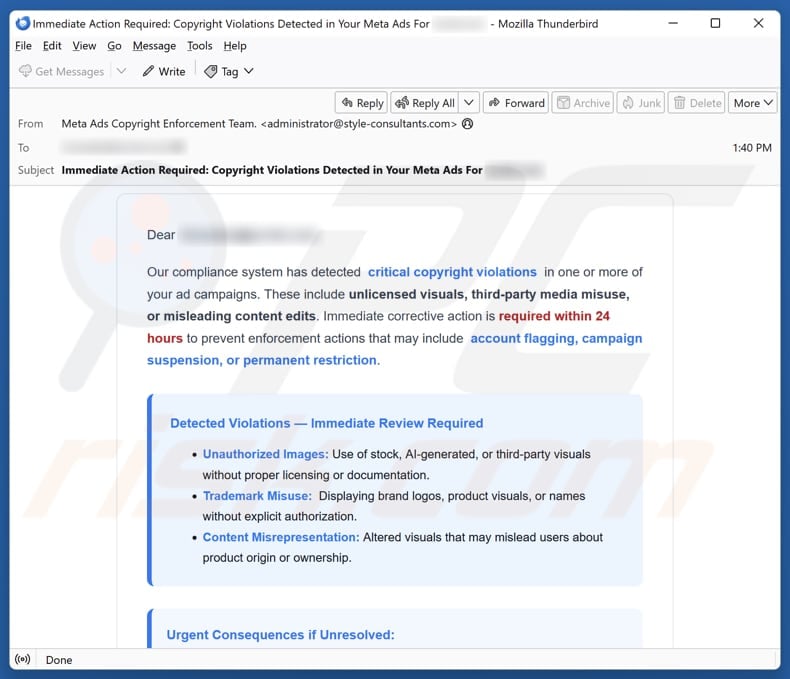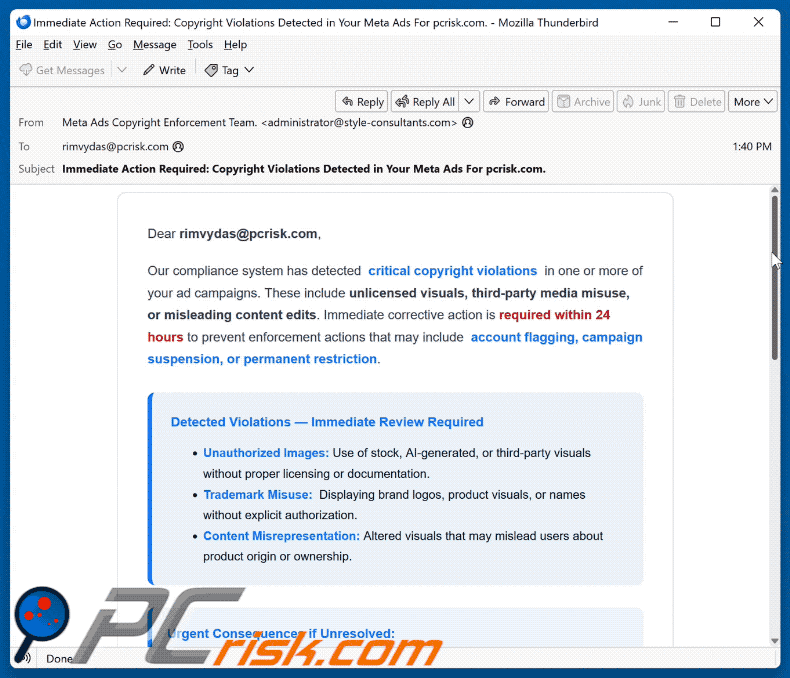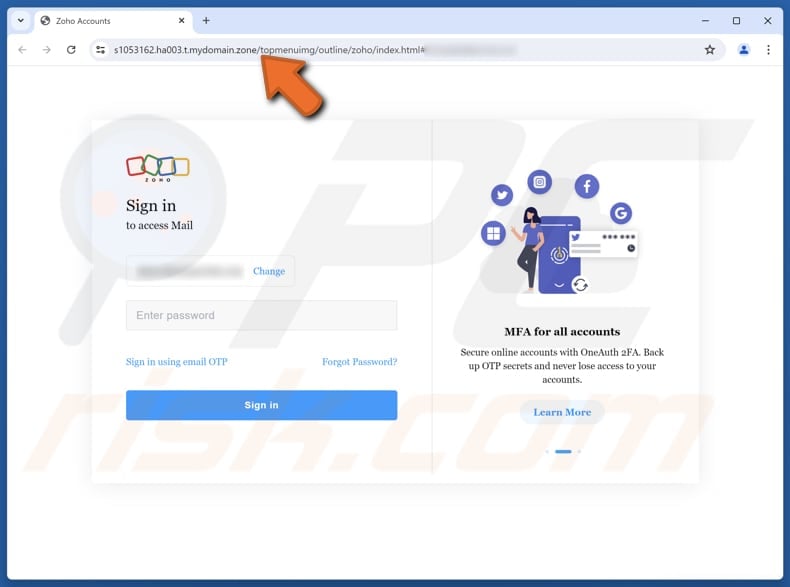How to spot fake emails like "Meta Ads Critical Copyright Violations"
Phishing/ScamAlso Known As: Meta Ads Critical Copyright Violations phishing scam
Get free scan and check if your device is infected.
Remove it nowTo use full-featured product, you have to purchase a license for Combo Cleaner. Seven days free trial available. Combo Cleaner is owned and operated by RCS LT, the parent company of PCRisk.com.
What kind of scam is "Meta Ads Critical Copyright Violations"?
We have examined the email and determined that it is a phishing attempt. The scammers behind it pretend to be from Meta company to trick recipients into believing that there have been some copyright violations. Their goal is to steal personal information from recipients through a deceptive website.

More about the "Meta Ads Critical Copyright Violations" scam email
The email claims that Meta has detected serious copyright violations in the recipient's advertising account and demands immediate action within 24 hours. It states that unauthorized images, trademark misuse, and misleading content edits have been found. The message warns that failing to act could lead to campaign restrictions, account flags, or permanent suspension.
It instructs the recipient to review ads, verify licensing, and submit an appeal through a provided link ("Submit Appeal Now" button) to avoid enforcement actions. Clicking this link opens a fake site instructing visitors to sign in to access their mail. This page sends the entered information (email addresses and passwords) to scammers.
Once scammers have these details, they can access email accounts and grab details from private messages, send scam emails to others, distribute malware, or perform other malicious activities. They might also try using the same login information to access bank accounts, online stores, or social media profiles.
Sometimes, stolen login details are sold to other criminals online. For these reasons, it is important to always double-check emails before clicking links, entering personal info, or doing anything else that could cause privacy breaches or other issues.
| Name | Meta Ads Critical Copyright Violations Email Scam |
| Threat Type | Phishing, Scam, Social Engineering, Fraud |
| Fake Claim | Meta has detected serious copyright violations |
| Disguise | Urgent message from Meta |
| Related Domain | mydomain[.]zone |
| Detection Names (mydomain[.]zone) | alphaMountain.ai (Phishing), Combo Cleaner (Phishing), Fortinet (Phishing), Sophos (Phishing), Webroot (Malicious), Full List Of Detections (VirusTotal) |
| Symptoms | Unauthorized online purchases, changed online account passwords, identity theft, illegal access of the computer. |
| Distribution methods | Deceptive emails, rogue online pop-up ads, search engine poisoning techniques, misspelled domains. |
| Damage | Loss of sensitive private information, monetary loss, identity theft. |
| Malware Removal (Windows) |
To eliminate possible malware infections, scan your computer with legitimate antivirus software. Our security researchers recommend using Combo Cleaner. Download Combo CleanerTo use full-featured product, you have to purchase a license for Combo Cleaner. 7 days free trial available. Combo Cleaner is owned and operated by RCS LT, the parent company of PCRisk.com. |
Conclusion
This scam uses a fake urgent message to trick people into clicking a link and entering their login details. The link leads to a phishing site designed to steal account information. Once scammers get these credentials, they can access accounts, misuse personal data, and potentially sell the stolen information to others.
It is important to be aware that fraudulent emails can also be used to trick recipients into infecting computers. Here are some examples of scam emails used to extract sensitive information: "System Update", "Final Notice - Complete Verification", and "Office 365 Password Reset Request".
How do spam campaigns infect computers?
Malware is commonly spread via email attachments, including malicious executables, scripts, Office or PDF files, and compressed archives like ZIP or RAR. The infection occurs when the file is opened or when additional actions are taken (e.g., macros in an infected document are enabled).
Deceptive emails can also contain links leading to hacked or fake websites, which might silently download malware or persuade users to run it. Infection can occur only when the recipient opens the file or clicks the link.
How to avoid installation of malware?
Always get apps and files from trustworthy sources like official sites or app stores, and avoid pirated software or cracking tools. Do not trust pop-ups, ads, and buttons on unreliable websites. Also, do not agree to get notifications from suspicious pages.
Do not open attachments or click links in unexpected messages from unknown senders. Finally, keep your operating system and apps up to date, and run regular system scans using a reliable security tool.
The appearance of the "Meta Ads Critical Copyright Violations" scam email (GIF):

Text presented in the "Meta Ads Critical Copyright Violations" email letter:
Subject: Immediate Action Required: Copyright Violations Detected in Your Meta Ads For ********.
Dear ********,
Our compliance system has detected critical copyright violations in one or more of your ad campaigns. These include unlicensed visuals, third-party media misuse, or misleading content edits. Immediate corrective action is required within 24 hours to prevent enforcement actions that may include account flagging, campaign suspension, or permanent restriction.
Detected Violations — Immediate Review Required
Unauthorized Images: Use of stock, AI-generated, or third-party visuals without proper licensing or documentation.
Trademark Misuse: Displaying brand logos, product visuals, or names without explicit authorization.
Content Misrepresentation: Altered visuals that may mislead users about product origin or ownership.Urgent Consequences if Unresolved:
Campaign Restriction: Ad delivery may be paused or demoted automatically.
Account Flagging: A permanent compliance flag could be attached to your Meta Ads account.
Account Disablement: Continued violations may trigger permanent account suspension without appeal.Required Actions — Complete Immediately
Audit all active and scheduled ads — remove or replace any unverified visuals immediately.
Ensure all media assets have valid licensing or documented ownership.
If this notice is believed to be an error, submit an official appeal using the link below to prevent escalation.Action Required: You have 24 hours to resolve the violations or submit a verified appeal. Failure to act promptly may result in your account being flagged or permanently disabled under Meta's Copyright Enforcement Policy.
Submit Appeal NowImmediate action is strongly recommended to prevent irreversible restrictions.
We appreciate your urgent attention to this matter.
Meta Ads Copyright Enforcement Team.
This is an automated compliance alert. Please do not reply directly.
© 2025 Meta Platforms, Inc. • All rights reserved.
Privacy Policy | Terms | Help Center
Phishing site used to steal information:

Instant automatic malware removal:
Manual threat removal might be a lengthy and complicated process that requires advanced IT skills. Combo Cleaner is a professional automatic malware removal tool that is recommended to get rid of malware. Download it by clicking the button below:
DOWNLOAD Combo CleanerBy downloading any software listed on this website you agree to our Privacy Policy and Terms of Use. To use full-featured product, you have to purchase a license for Combo Cleaner. 7 days free trial available. Combo Cleaner is owned and operated by RCS LT, the parent company of PCRisk.com.
Quick menu:
- What is Meta Ads Critical Copyright Violations phishing scam?
- Types of malicious emails.
- How to spot a malicious email?
- What to do if you fell for an email scam?
Types of malicious emails:
![]() Phishing Emails
Phishing Emails
Most commonly, cybercriminals use deceptive emails to trick Internet users into giving away their sensitive private information, for example, login information for various online services, email accounts, or online banking information.
Such attacks are called phishing. In a phishing attack, cybercriminals usually send an email message with some popular service logo (for example, Microsoft, DHL, Amazon, Netflix), create urgency (wrong shipping address, expired password, etc.), and place a link which they hope their potential victims will click on.
After clicking the link presented in such email message, victims are redirected to a fake website that looks identical or extremely similar to the original one. Victims are then asked to enter their password, credit card details, or some other information that gets stolen by cybercriminals.
![]() Emails with Malicious Attachments
Emails with Malicious Attachments
Another popular attack vector is email spam with malicious attachments that infect users' computers with malware. Malicious attachments usually carry trojans that are capable of stealing passwords, banking information, and other sensitive information.
In such attacks, cybercriminals' main goal is to trick their potential victims into opening an infected email attachment. To achieve this goal, email messages usually talk about recently received invoices, faxes, or voice messages.
If a potential victim falls for the lure and opens the attachment, their computers get infected, and cybercriminals can collect a lot of sensitive information.
While it's a more complicated method to steal personal information (spam filters and antivirus programs usually detect such attempts), if successful, cybercriminals can get a much wider array of data and can collect information for a long period of time.
![]() Sextortion Emails
Sextortion Emails
This is a type of phishing. In this case, users receive an email claiming that a cybercriminal could access the webcam of the potential victim and has a video recording of one's masturbation.
To get rid of the video, victims are asked to pay a ransom (usually using Bitcoin or another cryptocurrency). Nevertheless, all of these claims are false - users who receive such emails should ignore and delete them.
How to spot a malicious email?
While cyber criminals try to make their lure emails look trustworthy, here are some things that you should look for when trying to spot a phishing email:
- Check the sender's ("from") email address: Hover your mouse over the "from" address and check if it's legitimate. For example, if you received an email from Microsoft, be sure to check if the email address is @microsoft.com and not something suspicious like @m1crosoft.com, @microsfot.com, @account-security-noreply.com, etc.
- Check for generic greetings: If the greeting in the email is "Dear user", "Dear @youremail.com", "Dear valued customer", this should raise suspiciousness. Most commonly, companies call you by your name. Lack of this information could signal a phishing attempt.
- Check the links in the email: Hover your mouse over the link presented in the email, if the link that appears seems suspicious, don't click it. For example, if you received an email from Microsoft and the link in the email shows that it will go to firebasestorage.googleapis.com/v0... you shouldn't trust it. It's best not to click any links in the emails but to visit the company website that sent you the email in the first place.
- Don't blindly trust email attachments: Most commonly, legitimate companies will ask you to log in to their website and to view any documents there; if you received an email with an attachment, it's a good idea to scan it with an antivirus application. Infected email attachments are a common attack vector used by cybercriminals.
To minimise the risk of opening phishing and malicious emails we recommend using Combo Cleaner Antivirus for Windows.
Example of a spam email:

What to do if you fell for an email scam?
- If you clicked on a link in a phishing email and entered your password - be sure to change your password as soon as possible. Usually, cybercriminals collect stolen credentials and then sell them to other groups that use them for malicious purposes. If you change your password in a timely manner, there's a chance that criminals won't have enough time to do any damage.
- If you entered your credit card information - contact your bank as soon as possible and explain the situation. There's a good chance that you will need to cancel your compromised credit card and get a new one.
- If you see any signs of identity theft - you should immediately contact the Federal Trade Commission. This institution will collect information about your situation and create a personal recovery plan.
- If you opened a malicious attachment - your computer is probably infected, you should scan it with a reputable antivirus application. For this purpose, we recommend using Combo Cleaner Antivirus for Windows.
- Help other Internet users - report phishing emails to Anti-Phishing Working Group, FBI’s Internet Crime Complaint Center, National Fraud Information Center and U.S. Department of Justice.
Frequently Asked Questions (FAQ)
Why did I receive this email?
Scammers send such emails to lots of people, not to one person in particular. These are general scam messages, not personal ones.
I have provided my personal information when tricked by this email, what should I do?
If your passwords have been exposed, update them immediately. For other sensitive details like credit card or ID numbers, contact the proper service providers or authorities right away.
I have downloaded and opened a malicious file attached to an email, is my computer infected?
Executable files can infect a device as soon as they are launched. Documents like PDFs or Word files are less risky, because opening them alone typically does not activate malware.
I have read the email but did not open the attachment, is my computer infected?
Opening the email is harmless. Malware requires at least clicking a link or opening a file to activate.
Will Combo Cleaner remove malware infections that were present in email attachment?
Combo Cleaner can remove most malware, but some threats are harder to find. That is why doing a full system scan is advised.
Share:

Tomas Meskauskas
Expert security researcher, professional malware analyst
I am passionate about computer security and technology. I have an experience of over 10 years working in various companies related to computer technical issue solving and Internet security. I have been working as an author and editor for pcrisk.com since 2010. Follow me on Twitter and LinkedIn to stay informed about the latest online security threats.
PCrisk security portal is brought by a company RCS LT.
Joined forces of security researchers help educate computer users about the latest online security threats. More information about the company RCS LT.
Our malware removal guides are free. However, if you want to support us you can send us a donation.
DonatePCrisk security portal is brought by a company RCS LT.
Joined forces of security researchers help educate computer users about the latest online security threats. More information about the company RCS LT.
Our malware removal guides are free. However, if you want to support us you can send us a donation.
Donate
▼ Show Discussion